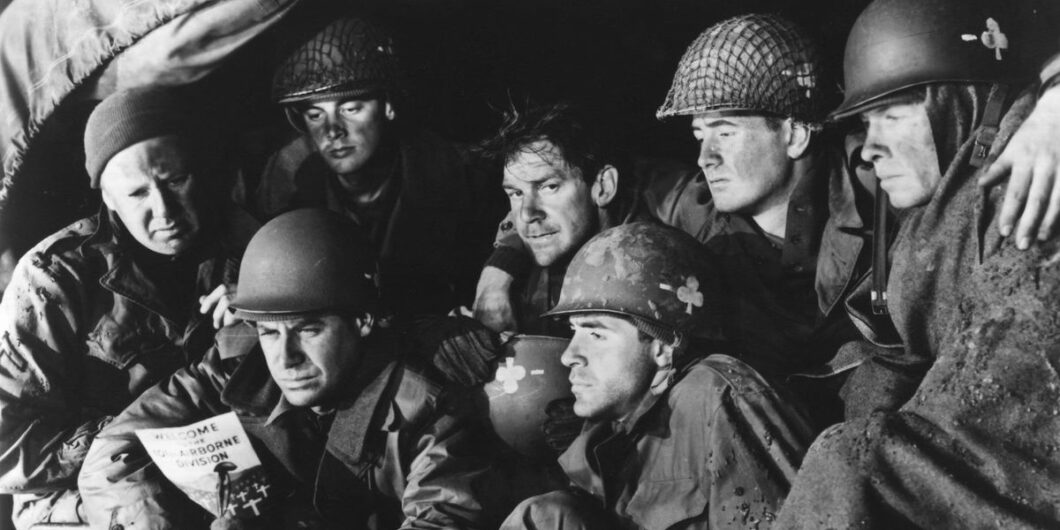Martin of Tours used his military discipline and martial courage to fight for people’s souls and defend justice for the common man.
Remembering the American Character at War
Every year, I try to write about a war movie or show for Memorial Day, to reawaken interest in American history and reflect on the lessons of the great generals and statesmen who carried the flag to victory, secured the republic, and ensured that political freedom is not overawed by catastrophe or despotism. This year, I recommend Battleground, the 1949 movie which first showed Americans a cinematic account of the famous Battle of the Bulge, Christmas 1944, the last major Allied confrontation with the Nazis.
World War II seems to have transformed America so thoroughly that it is extremely difficult to talk about American character. Instead, we contemplate a military power unlike any in the history of the world, boasting unimagined prosperity and a vast population. American politicians now casually talk about transforming entire nations in other parts of the world and removing the leaders of nuclear powers. They behave as gods or as Fate itself rather than politicians leading a free people through the difficulties that are man’s lot.
So it is urgently necessary to retrieve our most distant living memory, WWII, because it was the last time our politicians showed us how to balance an understanding of nature and chance with the moral and political pursuit of justice. Virtue then counted a lot more than technology or finance; it is therefore easier to begin to understand America and humanity by looking to that war. It seems impossible, but it is nevertheless true, that America was not then overmighty, but the country won its wars, however desperate the situation.
Cinematic Memory
Battleground was a big success in 1949. It earned writer Robert Pirosh an Oscar for the screenplay, which he based on his experience fighting in Europe in WWII, including at the Battle of the Bulge. The movie accordingly has a well-deserved fame for portraying the vicissitudes of war and the unusual moral drama of the soldier facing a terrible fate. Pirosh’s characters somehow represent America as a whole, not just a few men or a platoon. Of course, the movie retains the proprieties that made old Hollywood so loveable to Americans and make those movies so attractive today—they are largely free of the sordid. It is not the gore or horror of war that makes for the movie’s interest, though these are true enough—but another and more important truth, that war reveals national character and requires virtues we should admire, contemplate, and foster.
Dore Schary, the producer, was also nominated for the Best Picture Oscar, as was the director, William Wellman (himself a fighter pilot in WWI, fighting for the French army and then training American pilots once America joined the war). Paul Vogel, the cinematographer, also won an Oscar for his black and white photography. His stark contrasts and his shadows all contribute to show the soldiers’ terrible isolation in the winter landscape, where not even the sun shines on their faces. This is art in the service of revealing human dignity and it well deserved the honors it received. As a whole, the technical achievement of the movie is worth noticing. It’s very good evidence of the middlebrow culture that made Americans understand themselves as a nation striving with considerable success for a decent way of life.
But the art depends for any touch of greatness on its subject. The Battle of the Bulge was the last major Nazi war operation, a desperate, but daring counter-offensive, after the liberation of France. It is justly famous, because it takes its dramatic interest from its relation to the invasion of Nazi-occupied Europe that began on D-Day. Battleground shows us not the greatest amphibian operation in world history and the pouring forth of seemingly endless American armies and resources, but a small number of men. Underdogs. The American genius for logistics is helpless in face of the inclement weather. American strategy, far from achieving surprise, is instead surprised by the reckless Nazi winter offensive, once again slashing through the Ardennes in the hopes it would drive off the western advance.
In that situation, nothing but national character and military training are left to make the difference between victory and defeat, and, even more importantly, to make the difference between the noble and the vile. So instead of taking for granted America’s amazing victory, then fresh in people’s minds, Battleground offers the nation something of the experience of the veterans in their most trying moment. What is revealed about American character in war?
Learning the Truth about War
The film opens with an homage to the “battered bastards of Bastogne,” a very American way of maintaining equality while offering praise, mixing realism about suffering and misery with an awareness of an almost miraculous achievement. But we immediately shift to a funny Christmas scene—it’s 1944, the soldiers as yet know nothing about the German counter-offensive in the Ardennes forest (oddly reminiscent of the outbreak of WWI). They’re instead planning a weekend in Paris, desperately eager for the consolations of drink, shows, and young women.
Two newcomers to the 101st Airborne, replacements, are baffled by what they see, much as we are. Hooper and Layton find it hard to orient themselves; there is no way to figure out where they fit in or how they will get along with the veterans they’re joining. American democracy looks very much like “every man for himself” confusion at this point, but it is all told a joyful chaos, easygoing, more prone to horsing around than fighting. Democracy rises in one voice only to complain against the military bureaucracy, which separates friends, ruins any natural pleasures the men might have, and lords it over them without explanations or predictability. Men discuss what kind of wounds or other suffering could get them back to civilian life. After all, where’s the dignity in service when you’re taken for granted? Chaos is a belligerent form of freedom—the men don’t want to be treated like machines, although they know they must obey authority.
Battleground is a very sober, but a hopeful movie. That should guide our own attitude as we look around us today.
Suddenly, all this is swept away by news of the German offensive, and the men are faced with something new—an elite airborne division rushed to stem the tide at the road junction of Bastogne by truck, with few weapons and little ammunition. Once they arrive in Bastogne, they see fellow American troops retire from battle, almost broken. The new troops, kidding around and complaining, are not yet soldiers; the retiring men, weary and shocked, are no longer soldiers; in that moment, something of the horror of war is suggested, something that tests above all our theological grounding, our faith that God provides for us. Without that, war could become bestial and machine-like at the same time.
Layton goes to his friend Hopper after the first day of fighting; he finds him dead and no one in his unit even knows his name. War can wipe out our identities and everything we love. At that moment, the story becomes serious. When the platoon is shelled, a man even deserts, overwhelmed by fear. Other men are left wounded in the thick of battle, their surviving friends knowing they had promised to come back for them.
We see Layton partnered with Holley, a veteran returned to his unit from a hospital, a man who has experienced the shocks of war and is beginning to doubt that good it does. They’re soldiers on patrol, or manning roadblocks in the night, in fear of German infiltrators. It’s not even clear who the enemy is anymore. We see an incident when American units pull guns on each other in fear. “Every man for himself” could now spell disaster; but they trade sports and pop culture references to reassure each other they have a common way of life. It might make the difference between life and death.
The climax of the movie is a battle scene where veteran Holley flees an overwhelming German attack and rookie Layton follows him, not understanding what’s happening. Holley’s shame at his moment of cowardice implies an acknowledgment of his equality with Layton and at the same time a sense of duty as a veteran—he must become a leader, since he already has a follower. This complex relationship between the two men, developing over the brief days of the battle is the brotherhood in arms that keeps men fighting when catastrophe befalls them. The fleeing men become saviors of their unit as they perform a flanking maneuver that surprises the Germans.
America’s Cause
A brief essay cannot do justice to this famous movie, but only point out how thoughtful the story is, how mindful of its patriotic duty and at the same time mindful of the experience of battle on which it is based. Watch it this weekend and consider carefully the portrayal of these men fighting. Our warm feelings for them, as an audience, suggest that we recognize in their story something very important about America. The cause of freedom requires sometimes facing the evils of war and altogether requires some way of facing up to the inevitability of death.
Seriousness seems to be missing in the happy-go-lucky lives of citizens of the continental democracy, but this may not be entirely true. Perhaps it’s more a question of what crisis will bring out the best in men. At the same time, we should learn the twin lessons of this story. Men should not be asked to shoulder the whole burden of American policy unless it is utterly necessary, because there is an unbridgeable gap between the experience of battle and the comfort of civilian life. Even in the new context of the small, volunteer army, it remains the case that patriotism will only rarely burn brightly with the passions of war; and that Americans remain American when facing the necessities of war, so they should not be sent into conflicts that are too different from American life, lest they lose connection with everyone at home. American troops should not be tools in the fantasies of politicians and bureaucrats who want to play at global peacemaker, or else the faith of the men who serve will be betrayed and citizenship debased.
The resources of American democracy have everything to do with a capacity to feel shame and pride, and therefore to cohere into action despite the fact that Americans are held in contempt by their adversaries. This moral concern for each other that leads to practical action our civilian lives almost entirely conceal. It is missing from public discourse; it seems even to be hated by the believers of an ideology that increasingly rules our elite institutions. But it is the key to inspiring young men and we should ask to what extent they have the character of our forebears. Perhaps they too can become serious when they understand the necessity and feel the moral compulsion. Battleground is a very sober, but a hopeful movie. That should guide our own attitude as we look around us today.



